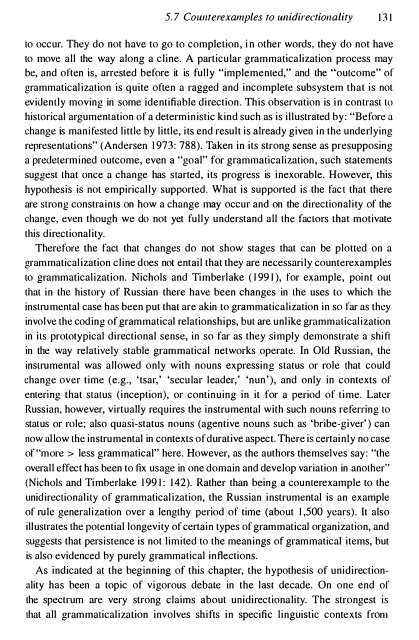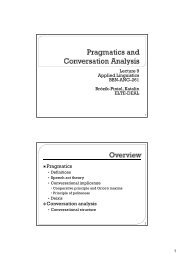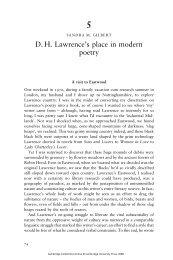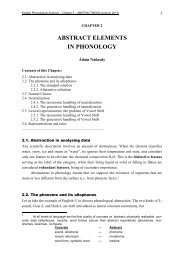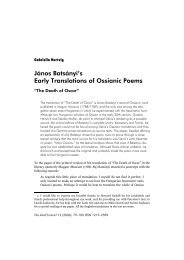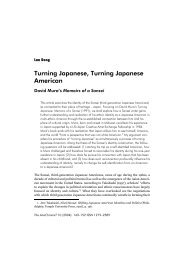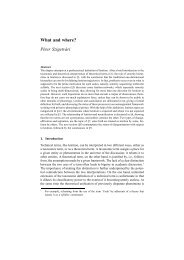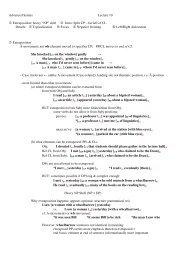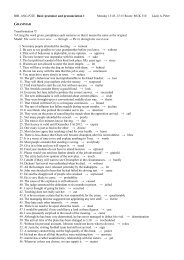Gram - SEAS
Gram - SEAS
Gram - SEAS
Create successful ePaper yourself
Turn your PDF publications into a flip-book with our unique Google optimized e-Paper software.
5. 7 CounterexampLes to wlidirectiollaLity 131<br />
to occur. They do not have to go to completion, in other words, they do not have<br />
to move all the way along a cline. A particular grammaticalization process may<br />
be, and often is, arrested before it is fully "implemented," and the "outcome" of<br />
grammaticalization is quite often a ragged and incomplete subsystem that is not<br />
ev idently moving in some identifiable direction. This observation is in contrast to<br />
historical argumentation of a deterministic kind such as is illustrated by: "Before a<br />
change is manifested little by little, its end result is already given in the underlying<br />
representations" (Andersen 1973: 788). Taken in its strong sense as presupposing<br />
a predetermined outcome, even a "goal" for grammaticalization, such statements<br />
suggest that once a change has started, its progress is inexorable. However, this<br />
hypothesis is not empirically supported. What is supported is the fact that there<br />
are strong constraints on how a change may occur and on the directionality of the<br />
change, even though we do not yet fu lly understand all the factors that motivate<br />
this directionality.<br />
Therefore the fact that changes do not show stages that can be plotted on a<br />
grammaticalization cline does not entail that they are necessarily counterexamples<br />
to grammaticalization. Nichols and Ti mberlake (1991), for example, point out<br />
that in the history of Russian there have been changes in the uses to which the<br />
instru mental case has been put that are akin to grammaticalization in so far as they<br />
invol ve the coding of grammatical relationships, but are unlike grammaticalization<br />
in its prototypical directional sense, in so far as they simply demonstrate a shift<br />
in the way relatively stable grammatical networks operate. In Old Russian, the<br />
instrumental was allowed only with nouns expressing status or role that could<br />
change over time (e.g., 'tsar,' 'secular leader,' 'nun'), and only in contexts of<br />
entering that status (inception), or continuing in it for a period of time. Later<br />
Russian, however, virtually requires the instrumental with such nouns referring to<br />
status or role; also quasi-status nouns (agentive nouns such as 'bribe-giver') can<br />
now allow the instrumental in contexts ofdurative aspect. There is certainly no case<br />
of "more > less grammatical" here. However, as the authors themselves say: "the<br />
overall effect has been to fix usage in one domain and develop variation in another"<br />
(Nichols and Ti mberlake 1991: 142). Rather than being a counterexample to the<br />
unidirectionality of grammaticalization, the Russian instrumental is an example<br />
of ru le generalization over a lengthy period of time (about 1,500 years). It also<br />
illustrates the potential longevity of certain types of grammatical organization, and<br />
suggests that persistence is not limited to the meanings of grammatical items, but<br />
is also evidenced by purely grammatical inflections.<br />
As indicated at the beginning of this chapter, the hypothesis of unidirectionality<br />
has been a topic of vigorous debate in the last decade. On one end of<br />
the spectrum are very strong claims about unidirectionality. The strongest is<br />
lhat all grammaticalization involves shifts in specific linguistic contexts from


